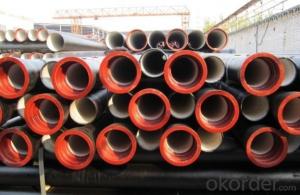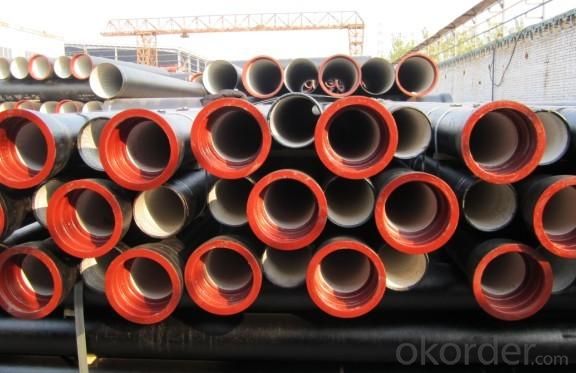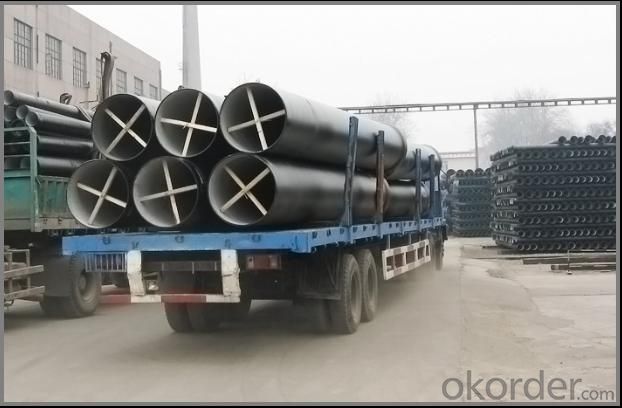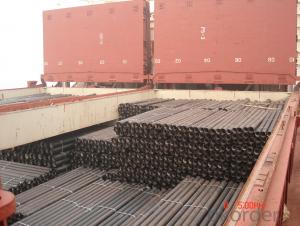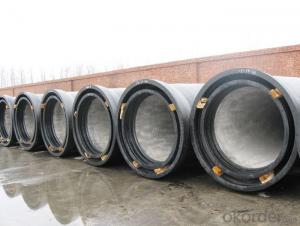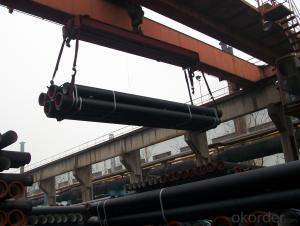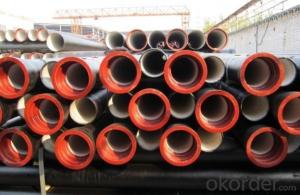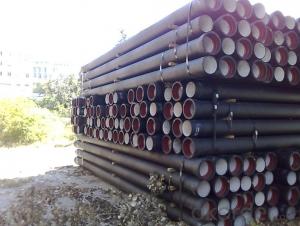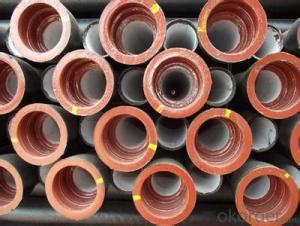Ductile Iron Pipe ISO2531:1998 DN100-DN1000
- Loading Port:
- China main port
- Payment Terms:
- TT or LC
- Min Order Qty:
- 20 m.t.
- Supply Capability:
- 200000 m.t./month
OKorder Service Pledge
OKorder Financial Service
You Might Also Like
1,Ductile Iron Pipe Description :
DI pipe fittings are manufactured according to ISO 2531 or BS EN545 or BS4772 FOR POTABLE WATER ,internal is cement lining or wet epoxy coating;External is zinc plus bitumen or wet epoxy coating. We also manufacture ductile iron fittings with fusion bonded epoxy both inside and outside. All the producets are sutible to water pipes fields.We have passed ISO9001,ISO14001,OHSMS18001 certificate.
Pipes confirm to ISO2531,K9 class,T type joint,6m long,with inside cements lining conform to ISO4179, outside Zinc spraying(130g/m2) and bitumen coating(70μm) conform to ISO8179.
Pipe ends: Spigot and socket ends, with 100% SBR rubber gaskets accoding to ISO4633.we can do third party inspection according to customer's request.
2,Main Features of the Ductile Iron Pipe:
1).Quality guarantee
• Chemical checking
• NDE after rough machining
• Mechanical testing after heat treatment
• Final NDE,dimension inspected
2).Quality document
• Full Q.A document as per client request
3).Packing and Shipping
• standard export package(carton/wooden case/pallet)
• accept FOB,FAS,CNF,CIF door to door etc or customer designated shipping agent
4).Service
• Drawing: we can translate your original drawing, offer best suggestion on design
• Quality: we have full set quality control system to guarantee the best quality.
• Inspection: inspect in house, all our products must be checked 3 times before packing
3,Ductile Iron Pipe Images:
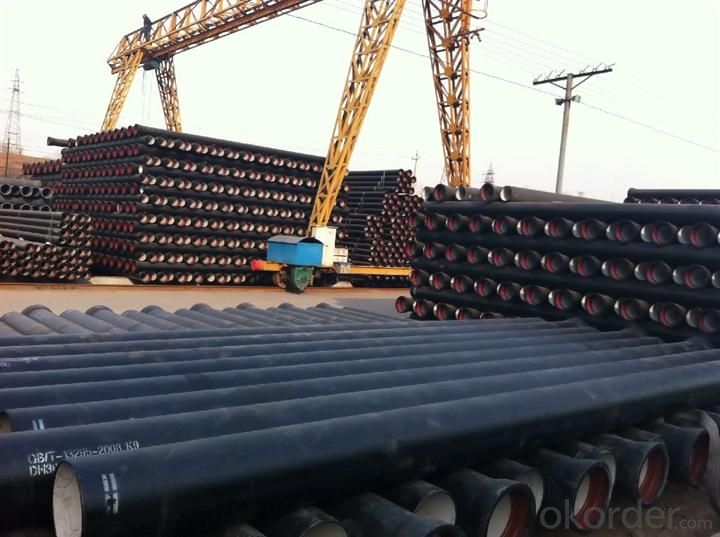
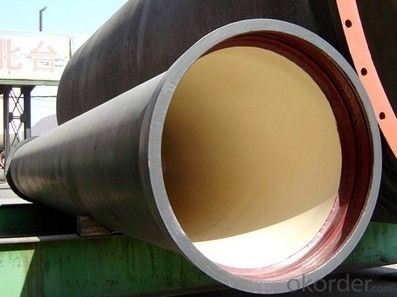
4.FAQ:
We have organized several common questions for our clients,may help you sincerely
Q: Why would you choose ductile iron pipe rather than other pipe materials?
A:The reasons are obvious for that not only ductile iron pipe possesses the inherent strength and flexibility of ductile iron, combined with proven corrosion protection systems, but also the cost savings can be achieved from design to installation and commissioning.
Q:Why can you guarantee the inner of pipes can’t be corroded?
A: High alumina cement mortar lining and sulphate-resistant cement mortar lining. These two special linings are applicable to inner anti-corrosion for sewage pipes, improving resistance to erosion of the sewage components.
- Q: Does centrifugal cast iron pipe work well with lining cement? Will it scale and breed bacteria?
- The situation in use abroad seems. It is considered that the corrosion of the inner wall of the centrifugal centrifugal ductile iron pipe and the rupture of the pipe are easy to occur when the content of chloride ion exceeds 5O0PPm in the pipe laying environment. This is mainly because, because the cement paste protection layer is the late spraying construction, it is not good to combine with the prefabricated core tube. It often causes water or moisture to seep in and causes oxidation and corrosion of the prestressing steel bars, resulting in fracture. The adhesive interface between cement mortar and centrifugally cast iron pipe is not reasonable. Because of the water absorption of cement, when the water enters the pipe, it is easy to destroy the interface and corroded the inner wall of the centrifugally cast iron pipe. Because it is a brittle material, it is easy to cause sudden accidents.
- Q: How do ductile iron pipes handle ground movement or settlement?
- Ductile iron pipes are renowned for their remarkable strength and flexibility, enabling them to effectively manage ground movement or settlement. Ground movement or settlement pertains to the natural shifts or settling of the earth's surface, which can exert stress on subterranean infrastructure such as pipes. Concerning ground movement, ductile iron pipes possess the advantage of enduring and absorbing the pressure and movement caused by shifting soil. The material's ductility permits the pipes to flex and bend to a certain extent without fracturing. This flexibility aids in distributing the load and minimizing the potential for harm. Additionally, ductile iron pipes exhibit high resistance to cracking or fracturing, even under extreme circumstances. This resilience stems from the material's unique microstructure, which imparts excellent tensile strength and impact resistance. Consequently, ductile iron pipes can withstand external forces and ground settlement without compromising their integrity. To further augment their capacity to handle ground movement or settlement, ductile iron pipes are frequently installed using flexible joints. These joints allow for slight movement and accommodate any shifting or settling of the ground. Furthermore, proper bedding and backfilling techniques are employed during installation to provide added support and stability. Overall, ductile iron pipes possess a proven track record in managing ground movement or settlement. Their strength, flexibility, and resistance to cracking establish them as a dependable choice for subterranean infrastructure, ensuring the durability and efficiency of water distribution systems.
- Q: What is the maximum temperature that ductile iron pipe can handle?
- The ability of ductile iron pipe to withstand high temperatures varies depending on factors such as the grade of ductile iron, the length of time exposed to heat, and the presence of external factors like corrosive environments. In general, ductile iron pipes can tolerate temperatures up to 400-450 degrees Fahrenheit (204-232 degrees Celsius) for short periods. However, it is crucial to refer to the manufacturer's specifications and guidelines to determine the exact maximum temperature limits for a specific grade of ductile iron pipe. Additionally, it is advisable to consider the consequences of thermal expansion, potential loss of mechanical properties, and any additional protective measures that may be necessary when operating at elevated temperatures.
- Q: Is ductile iron pipe breakable?
- The ductile iron pipe has many uses in our city construction, for our city water supply, gas supply and so on. But ductile iron pipes are also very useful in sewage disposal. As we all know, ductile iron pipe has many excellent properties, such as high strength, corrosion resistance, high pressure resistance, low accident rate, long service life and Gao Yanshen rate. It is an excellent water supply pipe.
- Q: Are there any alternatives to ductile iron pipe for water distribution?
- There are various options available for water distribution besides ductile iron pipe. Some commonly used alternatives include: 1. PVC (Polyvinyl Chloride) Pipe: PVC pipe is frequently chosen for water distribution due to its affordability, durability, and resistance to corrosion. It is lightweight, easy to install, and requires minimal maintenance. 2. HDPE (High-Density Polyethylene) Pipe: HDPE pipe is a flexible and durable choice for water distribution. It is resistant to corrosion, chemicals, and UV rays, making it suitable for both aboveground and underground installations. HDPE pipe is also known for its leak-free joints and long lifespan. 3. PEX (Cross-linked Polyethylene) Pipe: PEX pipe, a flexible plastic pipe, is commonly utilized for water distribution in residential and commercial settings. It is recognized for its ability to withstand freezing, scaling, and corrosion. PEX pipe is easy to install, has fewer joints, and is highly durable. 4. Copper Pipe: Copper pipe has a long history of use in water distribution due to its exceptional resistance to corrosion and extended lifespan. Although it is more expensive than other alternatives, copper pipe is renowned for its reliability and ability to handle high pressure. 5. Steel Pipe: Steel pipe is a robust and durable option for water distribution, particularly in high-pressure scenarios. It can endure extreme temperatures and resist external loads. However, steel pipe is more costly and requires specialized installation techniques. When selecting an alternative to ductile iron pipe for water distribution, it is crucial to consider factors such as cost, durability, corrosion resistance, installation requirements, and specific project needs.
- Q: What is the weight of ductile iron pipes?
- The weight of ductile iron pipes can vary depending on their size and wall thickness. On average, a 10-foot length of 6-inch diameter ductile iron pipe can weigh approximately 180 pounds. However, it is important to note that different manufacturers may have slight variations in weight due to differences in manufacturing processes and materials used. It is recommended to consult specific product specifications or contact the manufacturer for accurate weight information.
- Q: Are ductile iron pipes suitable for use in sewage pumping stations?
- Ductile iron pipes are highly suitable for use in sewage pumping stations due to their advantageous properties. These pipes are renowned for their durability, strength, and excellent corrosion resistance, making them an ideal choice for wastewater applications. They can endure the high pressures and abrasive characteristics of sewage systems without experiencing significant degradation or loss of performance over time. Moreover, the smooth interior surface of ductile iron pipes minimizes friction losses and prevents blockages. Additionally, these pipes have a long lifespan and require minimal maintenance, resulting in reduced overall operating costs. In conclusion, ductile iron pipes are an excellent option for sewage pumping stations.
- Q: What is the content of silicon in silicon molybdenum ductile iron?
- High silicon molybdenum ductile cast iron is developed for end users successfully reduces the cost, and the castings have high strength, good oxidation resistance, and has good performance under thermal cycling condition. This kind of ductile iron silicon content of 4% molybdenum content 0.6%-0.8%, currently designated as many car manifold and turbocharger shell, and molybdenum content than the silicon alloy casting 1% more for special high temperature exhaust pipe, heat treatment. High silicon molybdenum alloy nodular cast iron castings used in the production of automotive turbocharger.
- Q: What are the different sizes available for ductile iron pipes?
- Ductile iron pipes are available in various sizes, typically ranging from 3 inches to 64 inches in diameter.
- Q: Is there a kind of pipe called lined ductile iron pipe? Seeking manufacturers?
- This is basically used as drainage, ie the launching system. The fittings they use are different. You can use specific Baidu search or check, Suzhou arhccom Pipe Industry Co. Ltd., which specializes in Jiangsu ductile plastic lined pipe, ductile iron pipe and fittings. You say there are many manufacturers, they specialize in doing your jade lining plastic ductile iron pipe (second line brand), the new lining plastic ductile iron pipe (brand). Hope to help you.
Send your message to us
Ductile Iron Pipe ISO2531:1998 DN100-DN1000
- Loading Port:
- China main port
- Payment Terms:
- TT or LC
- Min Order Qty:
- 20 m.t.
- Supply Capability:
- 200000 m.t./month
OKorder Service Pledge
OKorder Financial Service
Similar products
Hot products
Hot Searches
Related keywords
